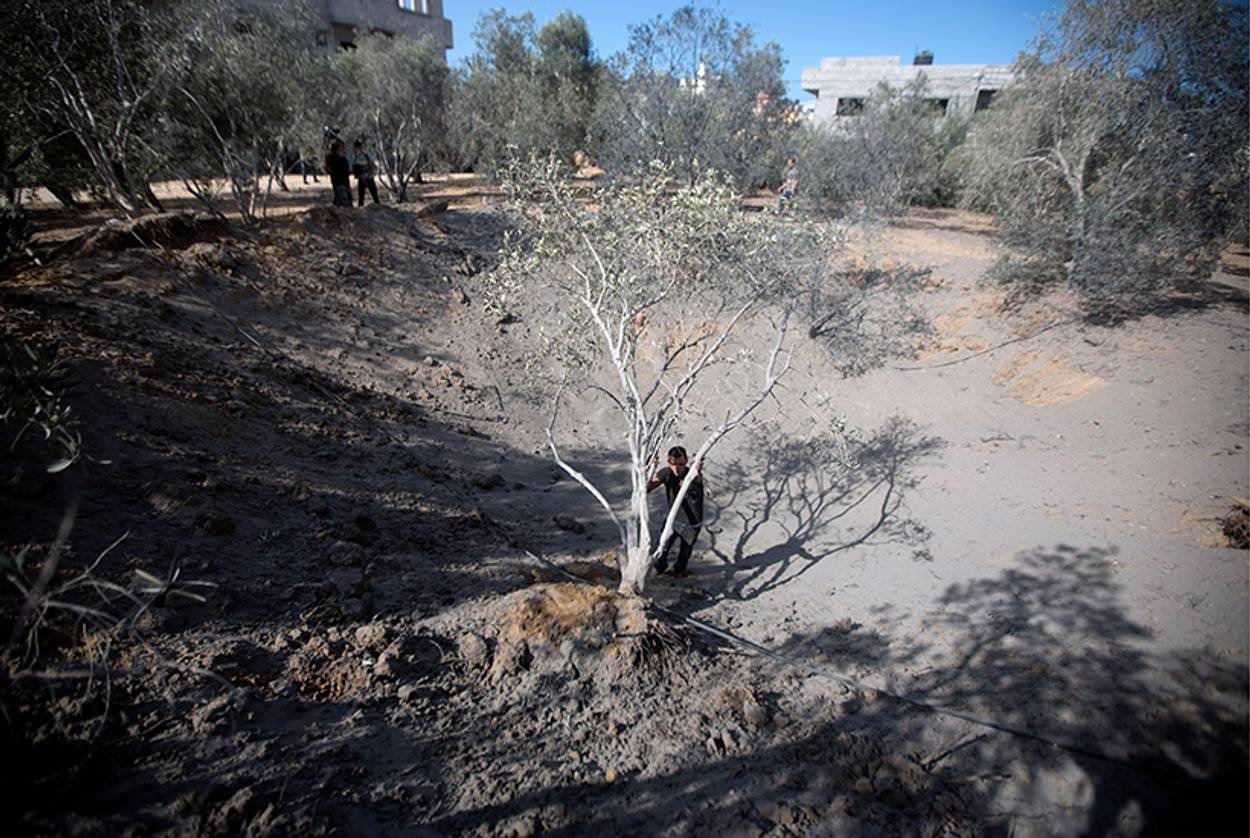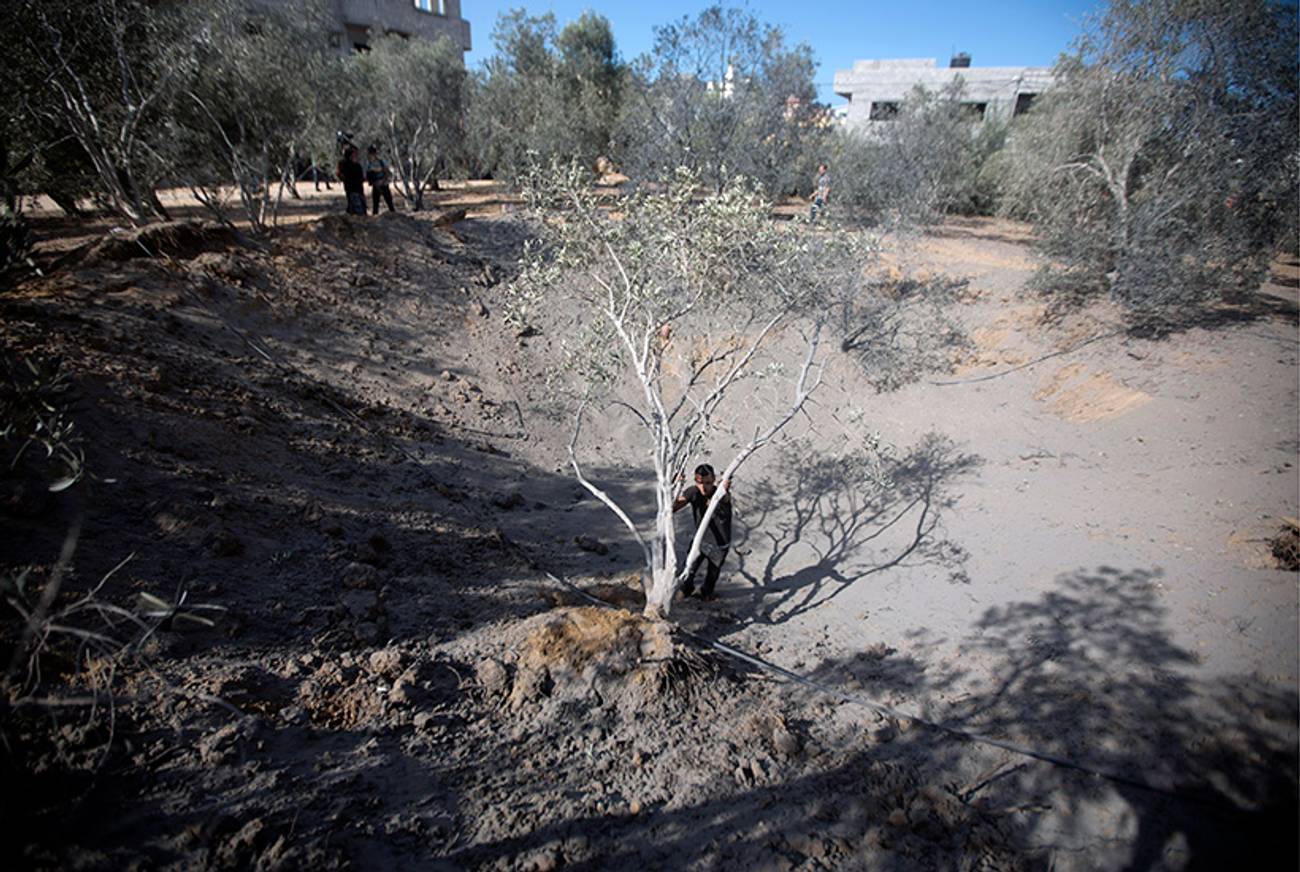The Arab-Israeli Peace Process Is Over. Enter the Era of Chaos.
The theater of the peace process was key to U.S. hegemony in the Middle East—and without the process, there will be no peace




This past weekend the White House clarified yet again what’s been apparent to everyone in the Middle East for quite a while now: The United States wants out, for real. “There’s a whole world out there,” National Security Adviser Susan Rice told the New York Times, “and we’ve got interests and opportunities in that whole world.”
To judge by the president’s decision making, Egypt and Syria apparently are no longer important parts of that world, nor is the shakeout from the Arab Spring, or preserving Washington’s special relationship with the Saudi oil kingdom, or other familiar features of American Middle East policy, like democracy promotion, which have been taken for granted by locals and the rest of the world alike. What matters seems to be getting out of the region faster, by making a snap deal with Iranian President Hassan Rouhani over Tehran’s nuclear program. But yeah, administration sources told the Times almost as an afterthought, we still care about the peace process.
The problem is that a deal with Iran, when taken together with a U.S. withdrawal from the region, means the end of the peace process. As an Israeli official visiting Washington told me last week, one result of the administration’s minimalist regional profile is that the Arab allies of the United States—from Jordan and Egypt to Saudi Arabia and other Gulf Cooperation Council states—will no longer enjoy the luxury of being able to count on the United States to pursue and protect their national interests, which means that they’ll have to do it themselves in a region where, as President Barack Obama said in his speech at the U.N. General Assembly meeting last month, the leaders “avoid addressing difficult problems themselves.”
What that means is that Washington’s Arab partners who are most concerned about Iran, like Saudi Arabia, now have a choice: They can defend themselves with all the weaponry the American defense industry has sold them over the years—or they can get someone else to do it. If most Arab regimes never really cared that much for the Palestinians in the first place, they clearly had even less use for the Israelis. But in the wake of a bad American deal with Rouhani, the Israelis may come in quite handy, as the only local power capable of standing up to a nuclear-armed Iran or stopping the Iranian nuclear program in its tracks.
There is plenty of evidence that the Gulf Cooperation Council states have already reached the conclusion that using the Israeli air force to fight their wars may be no more inherently loathsome—and a good deal cheaper—than relying on the unreliable Americans. Coordination between Israel and the Gulf Cooperation Council states is reportedly higher than it’s ever been before. And military and security relations between Jerusalem and Egypt’s ruling military junta are excellent, as both countries face mutual foes like Hamas in Gaza and local franchises of al-Qaida in Sinai.
What’s clear amidst all this traffic is that the Israeli-Palestinian peace process is presently the least important and least bloody conflict in the region, after the Syrian civil war, the Libyan civil war, Iraq’s violent partition, Egypt’s military crack-down, etc. From the point of view of national realpolitik, the only people who should be thinking long and hard about the end of the Arab-Israeli peace process are American policymakers.
Maybe it’s good news then that the lake of crocodile tears shed for 80 years over the Palestinian cause is about to evaporate into the thin desert air because the United States is leaving, and the Arab regimes obviously have more important things to worry about now—like their own security and survival. Yet from an American standpoint the end of the peace process is unfortunate—and not because it was ever likely to bring about peace between Arabs and Israelis, or usher in a reign of good feeling and peaceful relations across the Middle East.
* * *
Since Henry Kissinger first engineered the Arab-Israeli peace talks strategy in the wake of the 1973 Arab-Israeli war, many American policymakers have forgotten, or perhaps never understood, that peace talks were primarily a device to advance American interests—a regional puppet show with Washington pulling the strings. With overwhelming political, diplomatic, and (most important) military support for Israel, Washington turned Jerusalem into a dependent client. It was also an invitation to the Arabs who, having despaired of any hope of defeating Israel in war, were forced to come to Washington on bended knee to secure concessions—like promises of withdrawals—from the Jewish state.
The point of the peace process, therefore, was to turn Israelis and Arabs alike into servants of Washington, which succeeded in ejecting the Soviets as the United States became the ruling hegemon of the Middle East—home to a very large percentage of the world’s supply of oil. In turn, its ability to guarantee the security and safe transit of the world’s oil supply made the United States not only the de facto ruler of the Middle East, but also the most important power on the planet, even in the eyes of its potential rivals, like the Chinese.
U.S. policymakers lost the thread of this effective decades-long regional strategy when the Cold War ended. In the absence of the familiar global Soviet threat, Americans were easily overwhelmed by cries for a final peace deal that was arguably never in the American interest—since the perpetuation of the conflict by kicking the can down the road forever was the key to keeping both the Arabs and the Israelis firmly in the American fold. American policymakers and analysts who believed in what I’ve called “hard linkage” argued that because the conflict really did motivate the policies of regional rulers, solving the crisis would make all the region’s other problems go away. Advocates of “soft linkage” meanwhile argued that progress on the peace process would make American partners in the Middle East more willing to cooperate on matters of greater U.S. national interest, like for instance, the Iranian nuclear issue.
For anyone who doubted that the Israeli-Palestinian crisis was simply a local problem that made for useful political theater and not an active threat to the peace and stability of the entire planet, the Arab Spring provided a helpful reminder of the region’s true underlying fault lines. Obama was in office for barely two years when the Tunisian revolution erupted in December 2010, and soon the established order was in jeopardy throughout the region. Obama stopped pushing Benjamin Netanyahu and Mahmoud Abbas into negotiations because he eventually came to see that by forcing the issue he was getting nowhere and losing prestige in the process.
In retrospect, the Arab Spring was the first real assault on the peace process because it undermined the regional status quo that the United States had underwritten for four decades and kept in stasis with the peace process. Egypt and Jordan had treaties with Israel, and Syria was stalemated. The peace process was capable of checking states and their regional ambitions, but it had no power over the internal dynamics of Arab societies.
While the White House saw the upheavals in Egypt, Libya, Bahrain, and Syria as popular revolutions against a repressive order, they were actually, in each case, civil wars within Arab societies— pitting tribes, sects, Islamists, armies, and security services against each other. By avoiding all entreaties to support the Syrian rebels and topple Bashar al-Assad, Obama signaled that the United States had no dog in the fight, and no desire to work with key regional partners—especially Saudi Arabia, Jordan, and Turkey—to solve a problem that affected them directly. Riyadh’s former ambassador to Washington and currently head of Saudi’s National Security Council, Prince Bandar bin Sultan, has gone on a very public media campaign against the White House to express Saudi Arabia’s displeasure over the Obama Administration’s policies regarding—in ascending order of importance—Egypt, Syria, and Iran.
It is possible that, in time, Obama will be seen to be a visionary who understood that American interests would be best served by putting as much distance as possible between us and a messy, violent part of the world. Few people think that now. According to administration officials, Obama seemed to them “impatient or disengaged” during meetings on Syria policy. And maybe he has a point. Why commit American prestige—and money, and troops—to help one side or another in Syria’s civil war? Similarly, if Arabs and Israelis really want peace, let them figure it out. And if the Israelis and the Arabs have a problem with Iran, let them work out it out themselves, while the United States moves on to more important issues, like health care, or China policy.
But the reason the American withdrawal from the Middle East is a problem is that we already know what the region looks like without the United States—it looks like Syria, with every regional actor, from Saudi Arabia and Iran, al-Qaida and Hezbollah, at war with each other. The upside of not having an Arab-Israeli peace process—with round after round of worthless negotiations that go nowhere—is no upside at all, since the process was never really meant to bring peace to the Israelis and Palestinians in the first place. Rather, it was a token of the Pax Americana, Washington’s assurance of stability in a strategically vital region. With the United States absent from the Middle East, there’s no peace process, and as a result there will likely be no peace for anyone in the region.
***
Like this article? Sign up for our Daily Digest to get Tablet Magazine’s new content in your inbox each morning.
Lee Smith is the author of The Consequences of Syria.
Lee Smith is the author of The Permanent Coup: How Enemies Foreign and Domestic Targeted the American President (2020).